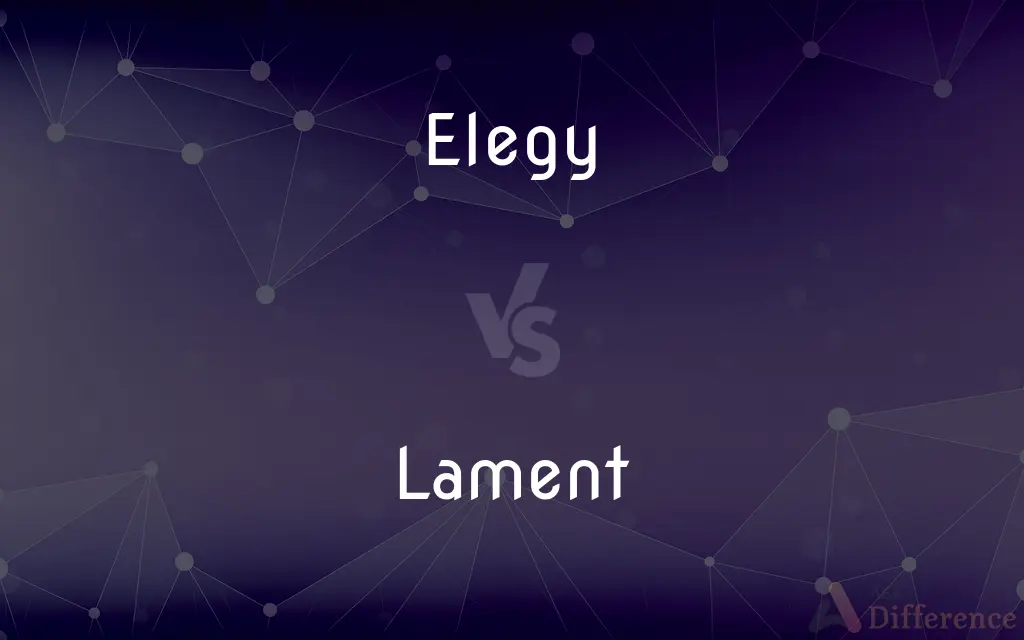Elegy vs. Lament — What's the Difference?
By Tayyaba Rehman & Urooj Arif — Updated on March 29, 2024
Elegy is a mournful, reflective poem, often about death, while lament is an expression of grief or sorrow, not limited to poetry.

Difference Between Elegy and Lament
Table of Contents
ADVERTISEMENT
Key Differences
An elegy is a specific form of literature, traditionally a poem, that expresses sadness or melancholy, typically mourning the death of an individual or lamenting a tragic event. It focuses on reflection, the expression of emotion, and often includes a praise of the deceased, contemplating themes of loss, mourning, and the transitory nature of life. In contrast, a lament is a broader term that can refer to any expression of grief or sorrow. This can be in the form of poetry, music, or any other medium. A lament doesn't necessarily adhere to the structural or thematic conventions of an elegy but shares the expression of profound sadness or mourning.
While an elegy is often structured, employing specific literary devices and a formal tone to convey its message, a lament can be more spontaneous or informal, capturing raw emotions in the moment of grief. Elegies are typically more reflective, offering not just expressions of grief but also insights, philosophical musings, or a quest for meaning in the face of loss. Laments, however, might focus more directly on the act of mourning itself, without the contemplative distance often found in elegies.
Elegies have a long literary tradition, with classical examples from Greek and Roman literature, evolving through the ages to adapt to different cultural contexts while maintaining their reflective and mournful quality. Laments, on the other hand, are universal across cultures and historical periods, found in folk songs, religious rituals, and personal expressions of grief, showcasing the human response to loss in its many forms.
The audience and purpose of these expressions also differ. An elegy often serves to share the grief with a wider audience, sometimes offering consolation or celebrating the life of the deceased. A lament might be more personal or communal, serving as an outlet for collective grief or a personal process of mourning, not necessarily intended for a wider public or for posterity.
Despite these differences, both elegies and laments fulfill a crucial human need to express sorrow and seek understanding or acceptance of loss. They provide a means to navigate through the complex emotions associated with grief, offering solace to both the creator and the audience.
ADVERTISEMENT
Comparison Chart
Definition
A mournful poem, often reflective, about death
An expression of grief or sorrow
Medium
Primarily poetry
Can be expressed in poetry, music, or speech
Focus
Reflection, mourning, praise of the deceased
Direct expression of grief or mourning
Structure
Often structured with literary devices
Can be spontaneous or structured
Tradition
Has a long literary tradition
Universal across cultures, not limited to literature
Audience
Wider audience, often public
Personal or communal, not necessarily public
Purpose
Mourning, reflection, sometimes consolation
Expression of grief, mourning
Compare with Definitions
Elegy
A poetic form mourning the loss of someone or something.
In Memoriam by Alfred, Lord Tennyson, is an elegy that laments the death of a close friend.
Lament
A vocal expression of deep sorrow or grief.
The lament for the lost sailors was sung at the seaside.
Elegy
Reflective poetry on mortality and loss.
W.H. Auden's Funeral Blues serves as an elegy for a lost loved one.
Lament
Can be a personal or collective expression of sorrow.
The nation shared a lament over the tragedy that befell the community.
Elegy
Poems that deal with themes of grief and mourning.
Milton’s Lycidas is an elegy for a fellow student.
Lament
An expression of mourning, not confined to poetry.
The mother's lament for her child touched everyone's heart.
Elegy
A form of poetry that praises a deceased individual.
Percy Bysshe Shelley's Adonais is an elegy for John Keats.
Lament
Often found in music as a genre of sorrowful songs.
Traditional Irish laments capture the essence of communal grief.
Elegy
Literary expression of sorrow and contemplation.
O Captain! My Captain! by Walt Whitman elegizes Abraham Lincoln.
Lament
A cry of pain or grief, sometimes used in religious contexts.
The Book of Lamentations in the Bible expresses profound sorrow for the destruction of Jerusalem.
Elegy
In English literature, an elegy is a poem of serious reflection, usually a lament for the dead. However, "for all of its pervasiveness ...
Lament
A lament or lamentation is a passionate expression of grief, often in music, poetry, or song form. The grief is most often born of regret, or mourning.
Elegy
A poem composed in elegiac couplets.
Lament
To express grief for or about; mourn
Lament a death.
Elegy
A poem or song composed especially as a lament for a deceased person.
Lament
To regret deeply; deplore
He lamented his thoughtless acts.
Elegy
Something resembling such a poem or song.
Lament
To grieve audibly; wail.
Elegy
(Music) A composition that is melancholy or pensive in tone.
Lament
To express sorrow or regret.
Elegy
A mournful or plaintive poem; a funeral song; a poem of lamentation.
Lament
A feeling or expression of grief; a lamentation.
Elegy
(music) A composition of mournful character.
Lament
A song or poem expressing deep grief or mourning.
Elegy
A classical poem written in elegiac meter
Lament
An expression of grief, suffering, sadness or regret.
Elegy
A mournful or plaintive poem; a funereal song; a poem of lamentation.
Lament
A song expressing grief.
Elegy
A mournful poem; a lament for the dead
Lament
(intransitive) To express grief; to weep or wail; to mourn.
Lament
(transitive) To feel great sorrow or regret; to bewail.
Lament
To express or feel sorrow; to weep or wail; to mourn.
Jeremiah lamented for Josiah.
Ye shall weep and lament, but the world shall rejoice.
Lament
To mourn for; to bemoan; to bewail.
One laughed at follies, one lamented crimes.
Lament
Grief or sorrow expressed in complaints or cries; lamentation; a wailing; a moaning; a weeping.
Torment, and loud lament, and furious rage.
Lament
An elegy or mournful ballad, or the like.
Lament
A cry of sorrow and grief;
Their pitiful laments could be heard throughout the ward
Lament
A song or hymn of mourning composed or performed as a memorial to a dead person
Lament
A mournful poem; a lament for the dead
Lament
Express grief verbally;
We lamented the death of the child
Lament
Regret strongly;
I deplore this hostile action
We lamented the loss of benefits
Common Curiosities
Do all cultures have forms of elegies and laments?
Yes, expressions of grief, such as elegies and laments, are universal across cultures, reflecting the human experience of loss and mourning.
How do elegies and laments differ?
Elegies are specific types of reflective poems about death, often structured and contemplative, while laments are broader expressions of grief that can be found in various mediums and may not follow a specific structure.
Is lamentation always about death?
No, lamentation can be about any form of loss or sorrow, not just death. It can express a wide range of emotional grief.
What is an elegy?
An elegy is a mournful or reflective poem, typically lamenting the death of an individual or mourning over a tragic event.
Why do people write or perform laments?
People write or perform laments as a way to process and express their grief, find solace, and sometimes to share their sorrow with others.
Are laments performed at funerals?
Yes, laments are often performed at funerals as part of the mourning process, offering a way to vocalize grief and pay tribute to the deceased.
Can a song be considered an elegy?
While elegies are traditionally poems, the term can be loosely applied to songs that embody the reflective, mournful qualities of poetic elegies.
What defines a lament?
A lament is any expression of deep grief or sorrow, which can manifest in various forms, including poetry, music, or speech.
Can an elegy have a hopeful tone?
Yes, while elegies mourn loss, they can also include elements of hope, consolation, or appreciation for the life of the deceased.
How do elegies and laments help in coping with grief?
Both elegies and laments provide a therapeutic outlet for expressing sorrow, helping individuals and communities to process grief and begin the journey towards healing.
Share Your Discovery

Previous Comparison
Nymph vs. Naiad
Next Comparison
Feast vs. PartyAuthor Spotlight
Written by
Tayyaba RehmanTayyaba Rehman is a distinguished writer, currently serving as a primary contributor to askdifference.com. As a researcher in semantics and etymology, Tayyaba's passion for the complexity of languages and their distinctions has found a perfect home on the platform. Tayyaba delves into the intricacies of language, distinguishing between commonly confused words and phrases, thereby providing clarity for readers worldwide.
Co-written by
Urooj ArifUrooj is a skilled content writer at Ask Difference, known for her exceptional ability to simplify complex topics into engaging and informative content. With a passion for research and a flair for clear, concise writing, she consistently delivers articles that resonate with our diverse audience.
















































